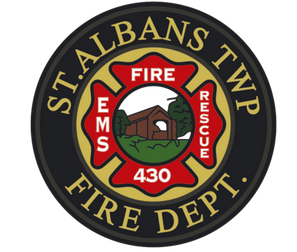
Proudly Serving...
- St. Albans Twp.
- Alexandria
- Liberty Township
Paid for by St. Albans Township Firefighters Association
Fire Levy Facts:
What is on the ballot?
The levy on the ballot represents the majority of funding for your fire department. A vote FOR this levy will replace a 4 mill levy that has already expired with a new 7 mil levy. This new levy will cost the owner of a $100,000 home $245 annually, or $20.42 per month.
What will my ballot look like?
PROPOSED TAX LEVY (REPLACEMENT AND INCREASE) TOWNSHIP OF ST. ALBANS
A majority affirmative vote is necessary for passage.
A replacement of 4 mills of an existing levy and an increase of 3 mills to constitute a tax for the benefit of the Township of St. Albans for the purpose of fire protection and emergency medical services that the county auditor estimates will collect $996,000 annually, at a rate not exceeding 7 mills for each $1 of taxable value, which amounts to $245 for each $100,000 of the county auditor's appraised value, for a continuing period of time, commencing in 2024, first due in calendar year 2025.
0 FOR THE TAX LEVY
0 AGAINST THE TAX LEVY
What happens if the levy fails?
The bulk of the funding for the St. Albans Township Fire Department is a 4 mil levy, which expired in 2024 and is collected through the end of the year. A failure of this replacement levy will result in the fire department losing the majority of its funding beginning in January 2025. A combination of layoffs, service reductions, and a possible closure of the department will be necessary.
Do Fire Levies increase the amount of money generated with increased development and inflation?
No. The total amount of money a levy can generate cannot be any more than the total amount that was originally approved by the voters.
There are two different types of tax rates - voted and effective. The reason for this difference in tax rates is due to House Bill 920, which is an Ohio law that passed in 1976 as a way to protect property owners against unvoted increases in taxes. HB 920 requires a calculation to reduce the effective tax rate that is applied to property owners so that as their property value increases over time (due to reappraisal/update), the amount of taxes owed stays the same.
HB 920 is the reason why the effective rate is significantly less than the original voted rate. It is also the reason why most Fire Departments across the state have to periodically pass new property tax levies in order to increase their revenue to keep up with inflation.
I still have more questions
Tax levies can be confusing and often subject to many variables like CAUV, exemptions, etc. Fire Chief Mike Theisen is available to any resident who has questions about this levy or any other fire department topic. He can be reached at 614-403-4293 or mtheisen@stalbanstwp.org.